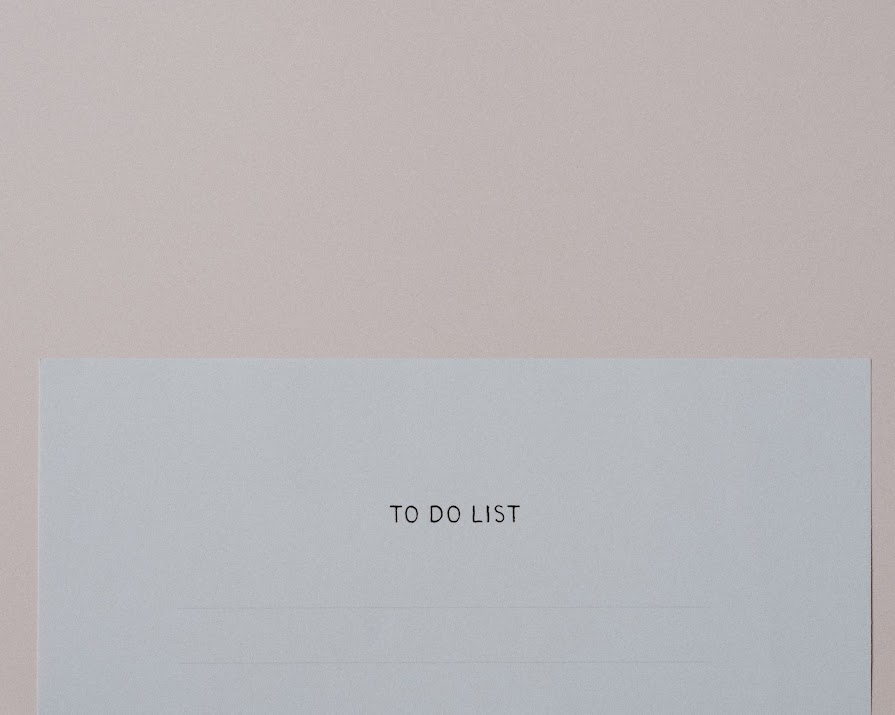
By Niamh Ennis
26th Mar 2022
26th Mar 2022
Think of procrastination as another form of self-sabotage. Your fear of failure, or being seen to fail, your concern of being judged or laughed at, your anxiety of not being good enough all overpower your desire or need to get things done.
I have the potential to annoy some people. I am one of life’s doers. I am an action taker. I like to have a deadline, something to aim for, to achieve and if I’m being fully honest, usually, well ahead of time. I’ve even been known to write out a to-do list, just so that I can immediately put a pronounced tick beside each of the completed tasks, such is my desire to get things done quickly and ahead of time.
But I have friends who prefer to procrastinate and leave things until the very last minute. For the love of God and all that’s holy, why would you do that to yourself? I don’t understand many things, but that one has to be at the top of my list. When I question them on this, they tell me it’s because they work best under pressure, which again is an alien concept to me.
Despite my mocking of their ways, I do accept that for many people it’s not always a case of leaving it until the last minute, but it is a definite case of procrastination, something which we have all faced at one point or another in our lives. It’s actually quite human for us to consider not doing something because we don’t want to, but it’s the ‘why we don’t want to’ that I want to investigate a little more. Whenever I’ve been at most productive and feeling satisfied and yes, maybe a little smug, I am reminded why, for me, procrastination never works. But first, let’s understand exactly what it is we are talking about.
Advertisement
What is procrastination?
To procrastinate is the act of delaying or postponing a task or set of tasks. It is the practice or habit of avoiding urgent tasks, despite the inevitable undesirable consequences. When people procrastinate, they often defer or delay priorities and instead focus on less important, more attractive and simpler duties. It is the energy that prevents you from following through on what you set out to do. So, you do nothing. Until you have to.
Think of procrastination as another form of self-sabotage. Your fear of failure, or being seen to fail, your concern of being judged or laughed at, your anxiety of not being good enough all overpower your desire or need to get things done.
Despite what you might have been told in the past, procrastination is about more than just being lazy or feeling unable to manage your time better, so you can stop feeling bad about your propensity to postpone or put things off. It’s a much more profound problem and yet before you dismiss yourself as being a lost cause, the good news is that you can definitely work on and overcome it.
Which of these three types of procrastinators are you?
BUZZ SEEKERS
Those who chase the thrill of putting off tasks until the very last minute and believe that they work best under intense pressure.
DODGERS
Those who procrastinate simply so that they escape being judged for how they perform. ‘If I don’t do it, nobody will know I can’t do it!’
Advertisement
WAVERERS
Those who experience real difficulty making significant or stressful decisions, usually because they’re deliberating over a variety of options and are unable to commit to a final conclusion.
Why do I procrastinate so much?
People procrastinate for different reasons. You’re likely to be a procrastinator if you have been at the receiving end of excessive pressure from others. For example, expectations for excellence, from parents or caregivers can, in truth, put us right off achieving certain things. If you have been told you’re not good enough, you won’t feel good enough, and you certainly won’t want to set yourself up for failure. It will feel easier to do nothing.
Yet whenever we resist doing something, there is usually a pretty good reason, even if it doesn’t make logical sense at first.
Some of the most common reasons behind procrastination include:
- Low self-esteem and self-worth
- Lack of confidence
- Fear of failure and fear of success (yes, that too!)
- Fear of being judged and criticised
- Chasing perfectionism
- Not being up for the challenge
- Low energy levels
- An inability to connect with your future self
Not to oversimplify it, but conquering procrastination begins with realising that you are doing it and instead of beating yourself up about what is a very common problem, try and investigate more deeply just what’s causing it and where it began. When you understand the reasons behind your behaviour, you can have a much better chance of uncovering the right strategy to manage and overcome it.
Advertisement
Four tips to overcome procrastination
These tips can help work through some of the difficult emotions that stop you from getting things done.
Smaller achievable steps and immediate rewards
You are more likely to achieve something new if it feels achievable and not too overwhelming. So, break down your goals into much smaller and more ‘doable’ tasks. This will help you connect with your desired outcome and make it far more likely that you will commit to doing what’s required, exactly when it’s required. Also, make sure that the reward you give yourself for having completed something is immediate and in the present moment. That works magic!
Awareness heals
Similar to all coping strategies, procrastination happens subconsciously, and you may not even be aware that you are doing it. So, how can you disrupt the cycle of procrastination, if you don’t even know that you’re doing it in the first place? You first become aware of it. You observe and notice when you are in the midst of doing it. You’re likely to procrastinate less just by noticing when and how you feel when you do it.
Release the need to be perfect
Advertisement
I’ve heard procrastination being described as perfectionism in disguise. The problem with this is that perfectionism is often considered as something desirable and that it is good to aim for perfection. The truth is that it’s not because there is no such thing as perfection. So, by going after something that does not exist, you are doomed to always feeling disappointed and forever feeling like you are failing. Chasing perfectionism, therefore, perpetuates procrastination, so what would happen if you choose to let go of the chase and recognise progress itself as perfection? Try it and see!
Engage self-compassion
This might sound basic, but if you want to overcome procrastination, and feel better about yourself overall, start with giving yourself a break. It’s really okay and not at all unusual, to make mistakes, to feel embarrassed or even to fail. Be nicer to yourself. Treat yourself like you would treat a friend. Practice forgiving yourself even when you make mistakes. Life is about learning and evolving, and the only real way to learn is to make mistakes and grow from them.
There are so many different tricks that you can employ to help you get past your procrastinating ways; but the truth is, if something needs to be done, it needs to be done, so my honest advice is to grab the nettle, prepare a reward for when you’re done and always place your focus on how your future self will thank you. Because she will!
In the words of American author, Thomas J Vilord, “if you have goals and you have procrastination, you have nothing. If you have goals and you have action, you can have anything!”
Niamh Ennis is Ireland’s leading Transformation Coach and Writer. She’s known for her practical solutions to life’s challenges and her ability to tell you not what you want to hear but always what you need. Niamh is currently accepting applications for her Summer The RESET for Change 3 Month 1:1 Private Coaching Programme. She is also host of the TOUGH LOVE ENERGY™ Podcast. Find her on Instagram @1niamhennis or visit niamhennis.com.
Advertisement
Photography by Annie Spratt.























